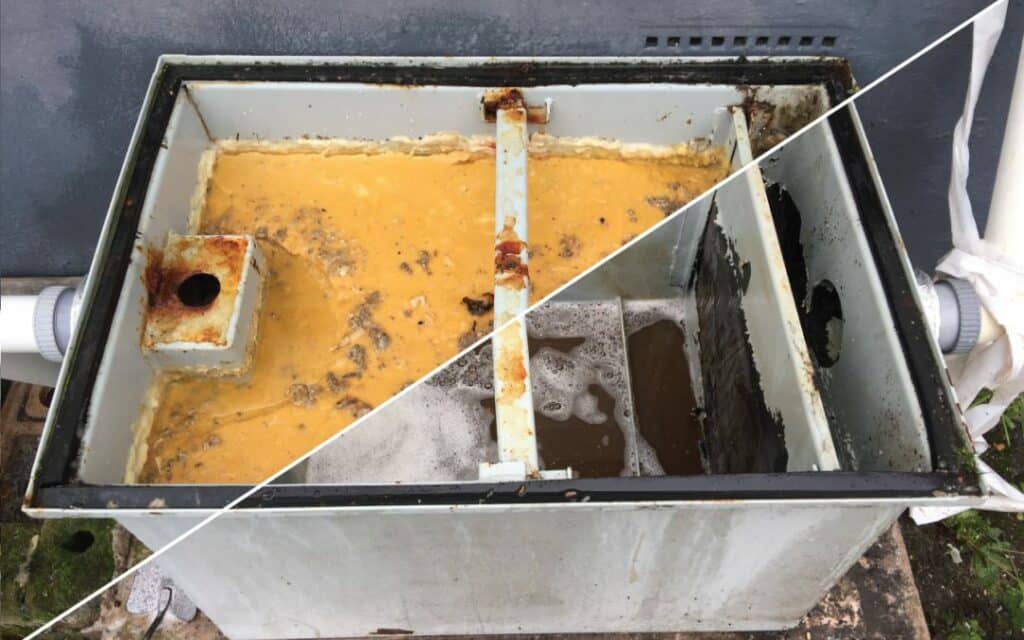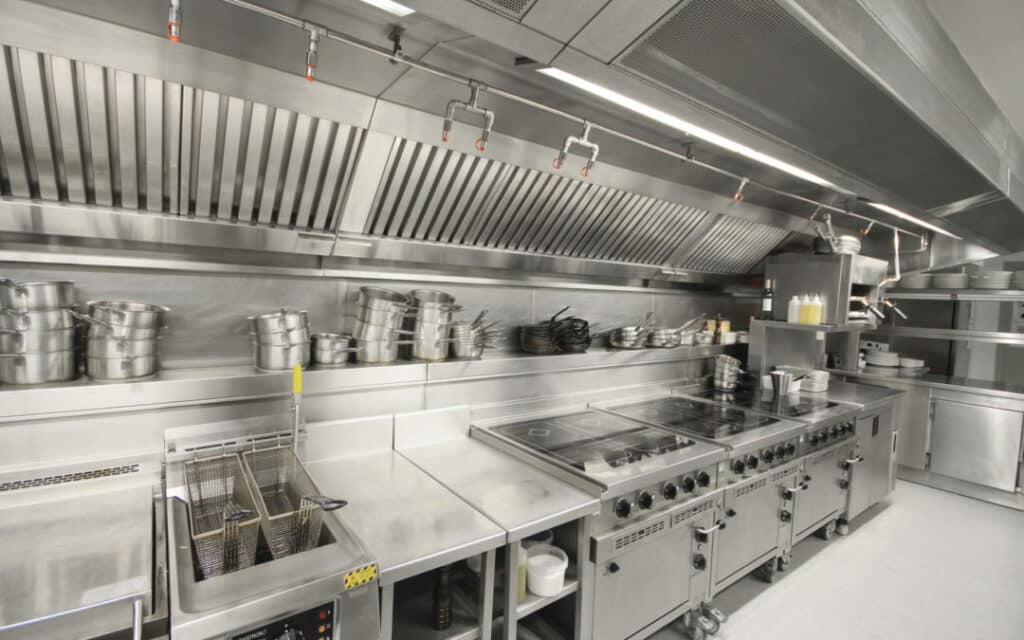Menu
Menu
Menu
Grease traps play an important role in any commercial kitchen by preventing grease and oil from clogging the plumbing and sewer systems. However, as the grease and oil accumulate in the trap, regular cleaning becomes necessary to maintain its effectiveness. Failing to maintain and clean the grease trap can lead to unpleasant odors, health hazards, and penalties from local authorities. This article will provide an overview of the importance of cleaning grease traps, the process, and the regulations and best practices that should be followed. We will also discuss the dangers of not maintaining the grease trap and why it is important to hire professionals for the task.
A grease trap, a grease interceptor, or a grease recovery device is a plumbing device installed in commercial kitchens’ drainage systems. The primary function of the grease trap is to separate and remove the fats, oils, and grease (FOG) generated by the cooking process before they can enter the sewage system. The grease trap typically looks like a large container with an inlet and an outlet, the inlet is connected to the drainage system, and the outlet is connected to the sewer or septic system.

3. Health and Safety: Accumulated grease and oil in a grease trap can harbor bacteria that can generate unpleasant odors and even health hazards. Regular cleaning of grease traps ensures that the FOG is removed and disposed of properly, preventing the buildup of FOG, an unsanitary environment, and the attraction of pests.
4. Compliance with Local Regulations: Most municipalities have regulations that require commercial kitchens to have their grease traps cleaned at regular intervals. Failure to comply with these regulations can result in penalties and fines. Regular cleaning of grease traps ensures that the kitchen complies with local regulations, avoiding potential legal issues.
4. Environmental Protection: By preventing grease from entering the sewer system, grease traps also help protect the environment and the treatment plants, which are meant to clean the wastewater. Cleaning grease traps benefits the kitchen’s plumbing system and helps maintain the environment’s health.
5. Preventing Extra Costs: Regular cleaning and maintenance can also aid in reducing the amount of grease, thereby reducing the frequency of cleaning, reducing the costs associated with regular maintenance, and ensuring the safe and efficient operation of a commercial kitchen.
Regular grease trap clean ing and maintenance are essential to ensure that it works correctly and prevent blockages, backups, health hazards, and compliance issues with local authorities.
The grease trap typically consists of a tank, usually made of concrete, steel, or plastic, placed in the line between the kitchen equipment and the sewer system. Inside the tank is a set of pipes, screens, or other types of media that trap the grease and oil. As the wastewater flows through the tank, the grease, and oil float to the top and are captured by the trap. The cleaner water is then discharged into the sewer system.
Cleaning a grease trap can be dangerous if not done correctly. The grease trap can be slippery, and the cleaning process can pose a fire, chemical, and biological hazard. Additionally, some grease traps are located in confined spaces, which can pose suffocation and toxic exposure risks. It is important to take all necessary precautions when cleaning a grease trap, such as wearing personal protective equipment, taking safety measures, and following the instructions provided by the manufacturer.
The frequency of cleaning a grease trap will depend on the usage of the kitchen, but it should be done at least every three months. This is because as grease and oil accumulate in the trap, regular cleaning becomes necessary to maintain effectiveness and keep the kitchen running smoothly. The local regulations and codes may specify the maintenance schedule depending on the size of the grease trap and the estimated grease output from the kitchen.
Maintaining a clean grease trap in a commercial kitchen involves scheduling regular cleaning and maintenance, training kitchen staff on proper usage, monitoring the grease trap regularly, using grease-fighting chemicals, keeping accurate records, and complying with local regulations. Regular cleaning, monitoring, and maintenance ensure that the grease trap works correctly and prevents blockages and backups in the plumbing system while maintaining compliance with local regulations. Keeping accurate records helps to address any potential issues with the grease trap on time.

If grease traps are not cleaned regularly, it can result in several problems, such as blockages and backups in the drainage system, reduced effectiveness of the trap, health hazards, environmental damage, legal issues, and extra costs. The FOG that builds up in the trap can cause blockages, attract insects and rodents, and if it enters the sewage system, it can contribute to the pollution of local waterways and harm marine life.
There are several ways to keep a commercial grease trap from smelling, the most important of which is regular cleaning. A grease trap should be cleaned at regular intervals to remove the buildup of FOG, and this will prevent unpleasant odors from emanating from the grease trap. Proper disposal of FOG, using odor control products, performing regular maintenance, using enzyme-based products, and correctly using the grease trap will help prevent odors from escaping. Each grease trap is different, and it’s crucial to have regular check-ups and maintenance to find out the best solution for a specific grease trap.
Commercial grease traps are typically maintained by having them pumped out by a professional service on a regular schedule. The frequency of pumping will depend on the volume of the grease trap and the amount of grease being discharged into it. The service technician will remove the accumulated grease and solid waste from the trap and then clean and sanitize it before putting it back in service. They will also inspect the trap to ensure it is functioning correctly and make any necessary repairs. They may also keep a record of the maintenance performed and the condition of the grease trap for future reference.
Commercial kitchens typically require a grease trap to prevent fats, oils, and grease (FOG) from entering the sewage system. Grease traps are usually needed for commercial kitchens because the FOG produced by the cooking process can solidify and cause blockages in the sewer lines, leading to backups and unpleasant odors.
It’s important to note that if the grease trap is not maintained and cleaned regularly, the accumulated grease and oil can cause blockages in the plumbing system, creating unpleasant odors and potential health hazards. It can also contribute to environmental pollution if grease enters the sewer system and causes damage to the treatment plant. In addition, failing to maintain and clean the grease trap can lead to penalties from local authorities due to non-compliance with local regulations.
Hiring professionals to clean a grease trap is important because it ensures that the task is done safely, effectively, and in compliance with local regulations. Professional service providers have the necessary equipment and expertise to properly clean a grease trap, which can be dangerous if not handled correctly. They know how to navigate the local regulations and will take appropriate measures to ensure that the grease trap is properly maintained and that any waste material is disposed of correctly and safely. In addition, professional service providers can also give advice and tips on maintaining the grease trap between cleanings to ensure it’s in top condition.
Neglecting the maintenance and cleaning of the grease trap can lead to unpleasant odors, health hazards, and potential penalties from local authorities. However, by using professional cleaning services, you can be sure that the job is done right and that your kitchen complies with the law. These professional services can also provide regular cleaning and maintenance to keep your grease trap in top working condition, thus keeping the kitchen running smoothly.
If you have any questions or concerns about maintaining and cleaning your grease trap or need help, please don’t hesitate to contact us. Our team of experts is ready to assist you and provide the professional services you need to ensure your commercial kitchen’s safe and proper functioning. We will be happy to assist you.

Site By: Strictly Plumbers